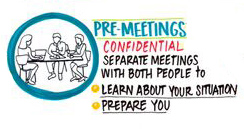In an effort to create an open and informative dialogue about mediation for participants, Christine Murray and Lisa Arora have come together to create a unique 12-part blog series that combines their insights into a comprehensive view of mediation.

Christine Murray practices exclusively in the area of family law and has extensive experience in negotiation, mediation, and litigation. She has acted as counsel for parties at countless mediations and has taught family law as an Adjunct Professor at the Peter Allard School of Law (University of British Columbia).
Lisa Arora is an internationally recognized expert in the field of graphic facilitation and a comprehensive family mediator who uses visuals to enhance communication and foster productive, mutually beneficial agreements during mediation.
The intention of this series is to provide answers to questions that people considering family mediation often ask themselves while evaluating the legal, emotional, and practical aspects of working with a mediator versus other options available to families facing conflict, separation, or divorce.
What to Expect in a a Pre-Mediation Meeting
After you and your ex have chosen a mediator to work with, expect the mediator to schedule individual pre-mediation meetings. Typically, these meetings will be 1-2 hours long, and are expected to be confidential meetings (subject to confidentiality exceptions, such as when there is a duty to report when a child is in need of protection, and so forth. Your mediator will explain confidentiality provisions in detail). If you plan to have a lawyer accompany you to mediation, the lawyer may sometimes also attend the pre-mediation meeting.
 While each mediator’s process will vary a little, some common reasons for holding a pre-mediation meeting are to:
While each mediator’s process will vary a little, some common reasons for holding a pre-mediation meeting are to:
- Discuss the mediation process and get answers to your procedural questions.
- Review and sign the Agreement to Mediate, which is the document that explains the overall details of how mediation works as a process, and outlines the terms you agree to abide by when entering mediation. The Agreement to Mediate must be signed by all parties before the start of mediation.
- Review and sign a retainer and billing agreement, which explains the mediator’s rate, what tasks they will be paid for (and how parties will share in the cost), and any requirements about retainers. Note: some mediators require retainers, others do not, but may expect payment at the end of each session.
- Allow the mediator to gather information about your situation. This is your chance to tell your story and share any details you think the mediator should know. Some mediators may take an organic approach to hearing your situation, others may have a list of questions to guide your telling of the story.
- Make you and the other party equally aware of resources, supports and community services to consider.
- Sometimes, mediators will ask you to do certain homework in preparation for the joint mediation session. For example, if your mediation involves finances, you may be asked to gather a list of assets and liabilities. Or, you might be asked to reflect on something particular such the vision you have for your child’s future and the values you wish to impart.
- Possibly recommend that you receive legal advice before mediating.
Note that part of the mediator’s responsibility in pre-mediation is to determine whether mediation is an appropriate process for your situation. Motivation, emotional readiness, capability and safety are a few of many possible determining factors. So, as part of your conversation, the mediator will ask some questions to screen for family violence, drug use, mental health issues, access to weapons, etc. These questions can feel intrusive, but they are required by the laws that govern family mediation, and it’s important to answer honestly.
After pre-mediation meetings have been held with all parties, the mediator will be able to let you know if it is appropriate to proceed with mediation. If it turns out that mediation is not a good fit for your situation, they will provide you with a reason why, and discuss other alternatives you have for resolving your dispute.
Try not to feel nervous about your pre-mediation meeting and think of it as an opportunity to learn more about the process and ensure your concerns are heard. If you want some tips on preparing for your pre-mediation, see our next post, Preparing for Your Pre-Mediation Meeting.
If you have more questions about what to expect in a pre-mediation session, or if you want information on using visual mediation during the process to improve communication and clarity, contact us at http://lisaarora.com/contact/
Important: Please note that this blog series is written in the context of providing information about family mediation and is not intended as legal advice. We recommend you seek legal counsel before making any major decisions about your personal legal circumstances, separation or divorce.


My friend and her husband are going to do mediation meetings and she learned she has to go in for a pre-mediation meeting and is nervous about what will happen. I wanted to look up some information to try and help her feel better. That is good to know this is where the mediator will gather information about the situation and that it is her chance to tell her side of the story. I think if she knew that she would feel a lot better about going. Thank you for the information!
Thanks for helping me understand what to expect in a pre-mediation meeting with your divorced spouse. My parents were divorced when I was really little and never got a mediator to help them through the legal system. To this day, I truly believe that things would have been more smooth because the mediator can help you understand any questions you might have about the procedure, gather information about the situation, discuss financials with, and make you aware of the resources, supports and community services to consider. Thanks again!